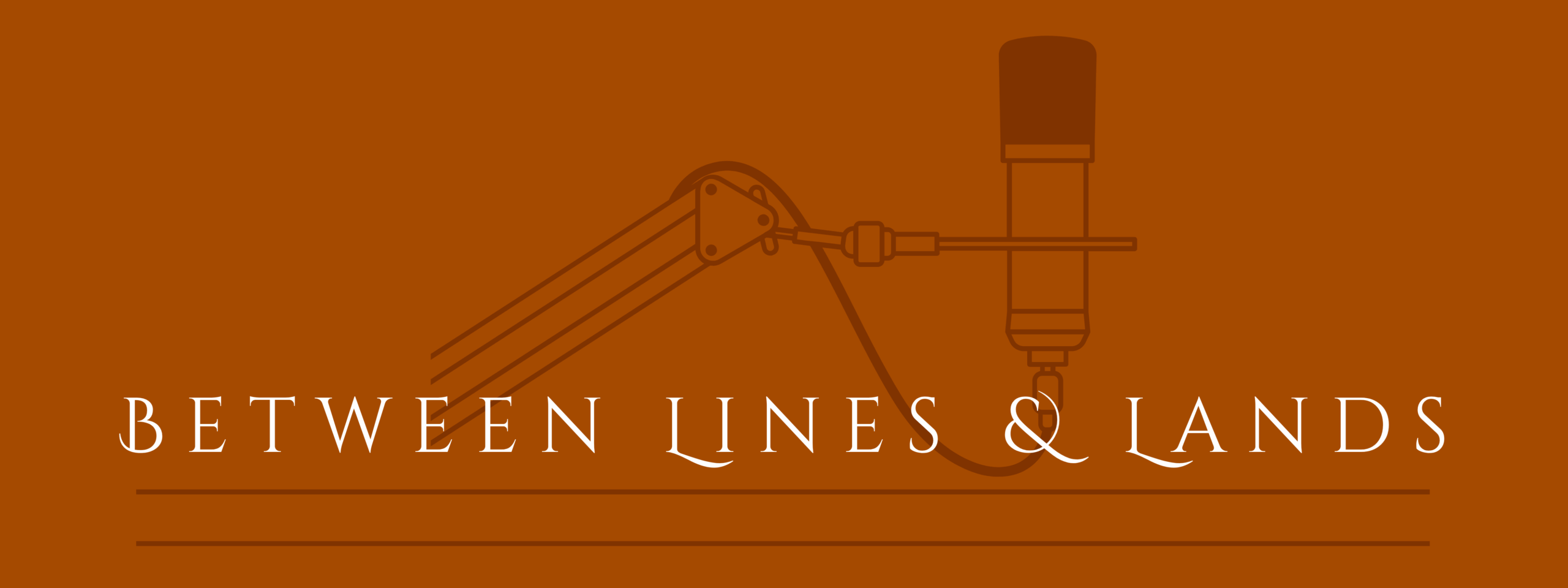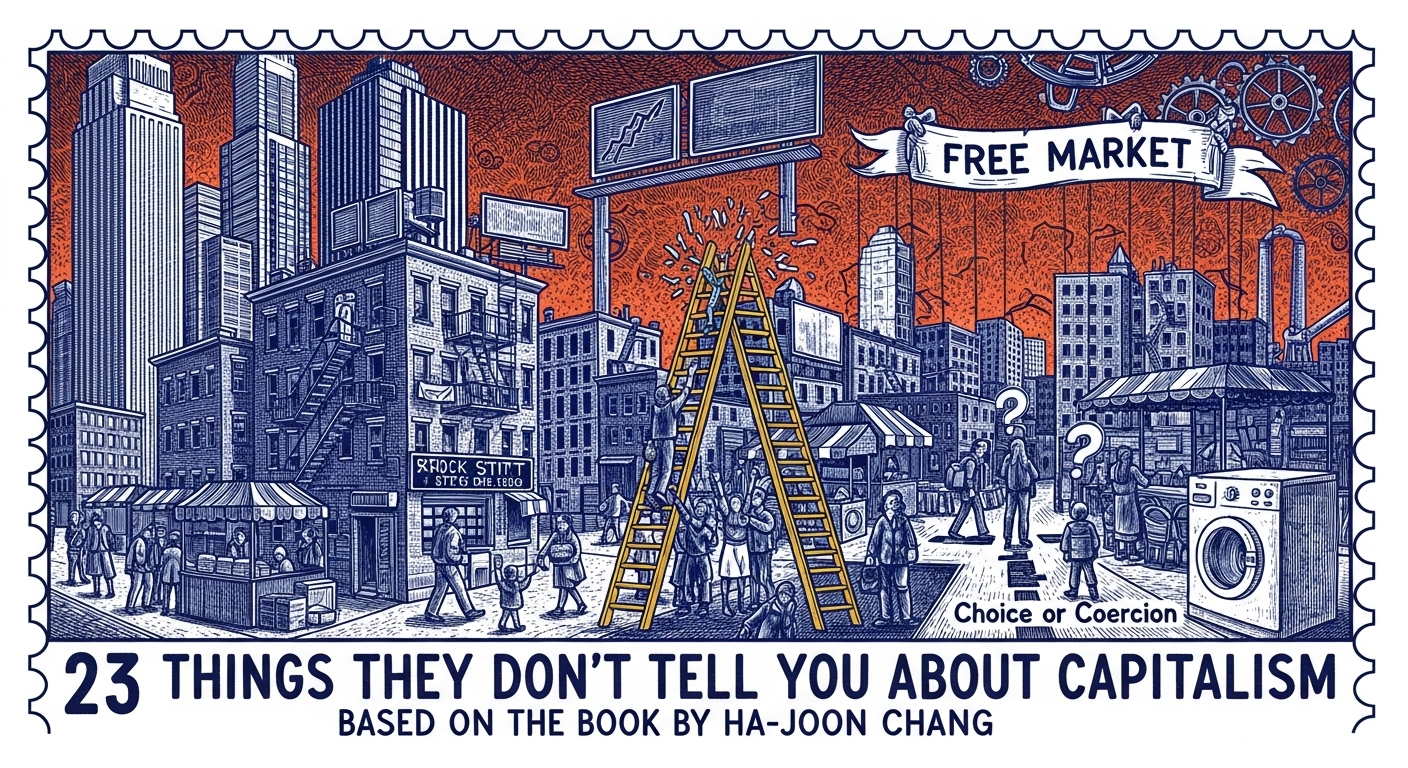Key Insight
Markets are not natural or free. They are shaped by rules, institutions, and power. These rules decide who benefits and who gets left behind.
Author: Ha-Joon Chang
Published: 2010
Length: 304 pages
Main Topics: Economic policy, regulation, development, globalization, corporate governance
Audiobook Duration: 8h : 58m
Why This Book Still Matters
Although published over a decade ago, the lessons from this book are more relevant than ever. From rising inequality to climate change and tech disruption, we are still dealing with the consequences of an economic system built on shaky assumptions.
“The global economy lies in tatters. The 2008 crash remains the second-largest economic crisis in history, after the Great Depression.”
Chapter-by-Chapter Summary
1. There Is No Such Thing as a Free Market
What People Say: Free markets are efficient and natural.
What Chang Says: All markets are shaped by rules. The real question is who makes the rules and who benefits.
- Rules always exist, even if invisible
- Child labor laws and patents shape markets too
- The real debate is which regulations benefit society
2. Companies Should Not Be Run Only for Shareholders
Main Point: Long-term success comes from including employees, suppliers, and communities in decision-making.
- Japanese and German companies offer strong alternatives
- Short-term shareholder focus weakens innovation
- Employee voice on boards improves outcomes
“Shareholders are not guaranteed fixed payments. Others in the business often carry more risk.”
3. Wages in Rich Countries Are Not Always Earned by Productivity
Myth: Rich country workers are more productive.
Truth: Wages reflect immigration policy, union strength, and power more than productivity.
- Borders protect wages
- Minimum wages and institutions matter
- Productivity alone doesn’t explain wage gaps
4. The Washing Machine Changed the World More Than the Internet
Insight: Earlier technologies like household appliances had deeper social effects, especially on gender roles.
- Freed women to join the workforce
- Changed families and economies
- Tech hype often ignores historical impact
5. If You Assume the Worst in People, That’s What You’ll Get
What People Say: Humans are selfish, so markets harness that.
What Chang Says: Institutions shape behavior. If you treat people like they are selfish, they act selfishly.
- Systems influence values
- Trust and cooperation can be built
- Culture shapes how people behave economically
6. Macroeconomic Stability Has Not Brought Real Stability
Myth: Low inflation creates economic growth
Truth: Focusing only on inflation ignores other risks like asset bubbles and financial crises
- Low inflation didn’t prevent 2008 crash
- Price stability is not enough
- Financial regulation matters more
7. Free Market Policies Rarely Help Poor Countries Get Rich
Insight: Most rich countries used protectionism to develop, but now push free-market policies on others
- East Asia developed with government help
- One-size-fits-all policies don’t work
- Historical strategies matter
8. Capital Still Has a National Identity
Myth: Corporations are now global
Reality: National culture and institutions still shape business
- Most companies stay loyal to home countries
- Government policies still support national industries
- Innovation remains locally rooted
9. We Are Not in a Post-Industrial Age
Insight: Manufacturing still matters. Many rich countries only look post-industrial because they outsource production
- Germany’s economy shows strength in manufacturing
- Services depend on a strong industrial base
- Outsourcing hides the truth
Key Economic Concepts Explained
Market Fundamentalism
Belief that free markets always work best. Chang challenges this with real-world examples.
Stakeholder Capitalism
Companies succeed long-term when they consider all stakeholders, not just shareholders.
Development Economics
Shows how countries actually developed, not how they say they did.
Institutional Economics
Rules, norms, and institutions shape economies more than abstract market forces.
Comparative Advantage
Classic theory that doesn’t hold in today’s complex, globalized economy.
Key Thinkers Referenced
Adam Smith
Often misused to defend free markets. In reality, he supported government regulation.
David Ricardo
His theory of comparative advantage doesn’t apply well to today’s world.
John Maynard Keynes
Argued for government intervention to stabilize the economy.
Milton Friedman
Strong free-market advocate whose ideas are directly critiqued by Chang.
Joseph Stiglitz
Shares Chang’s belief that markets need to be guided by policy.
Important Economic Terms
- Capital Controls: Tools to regulate international money flow
- Corporate Governance: Rules for how companies are run
- Creative Destruction: Innovation replaces old systems
- Export-Oriented Growth: Focus on exports to grow economy
- Financial Repression: Government keeps interest rates low for growth
- Import Substitution: Replacing imports with local goods
- Infant Industry Protection: Support for new industries until they’re strong
- Moral Hazard: Risk-takers avoid responsibility
- Neoliberalism: Ideology pushing deregulation and free markets
- Rent Seeking: Gaining wealth without creating value
- Washington Consensus: Free-market policies promoted globally
Major Themes of the Book
1. Markets Need Rules
There is no natural market. Every system has rules that reflect political decisions.
2. History Shows a Different Path
Most successful countries developed through policies they now discourage.
3. Stakeholders Matter
Companies that consider workers, communities, and long-term growth do better.
4. Culture and Institutions Shape Outcomes
Human behavior is flexible. Good systems build cooperation and trust.
5. No Universal Formula
Every country needs its own economic approach, based on its history and needs.
Practical Lessons
For Policymakers:
- Build rules that serve people, not just profits
- Learn from history, not theory
- Adapt to local realities
- Focus on long-term trust and institutions
For Business Leaders:
- Think beyond quarterly earnings
- Prioritize employees and communities
- Innovate for long-term value
- Build stronger relationships with stakeholders
For Citizens:
- Understand that economic rules are human-made
- Challenge claims about free market being natural
- Vote for policies that promote shared prosperity
- Recognize the power of institutions in shaping outcomes
Strengths and Criticisms
Strengths:
- Uses real historical examples
- Written in plain language
- Applies to real-world policy
- Questions dominant beliefs
Criticisms:
- Sometimes lacks specific steps for reform
- May downplay some benefits of markets
- History-based arguments don’t always translate to the present
- Less data-driven than some economists prefer
Quotes to Remember
“The free market doesn’t exist. Every market has some rules and boundaries.”
“People are not born entrepreneurs. Their conditions make it possible.”
“The washing machine has changed the world more than the internet.”
“Assume the worst and you get it. Assume the best and you get something better.”
Recommended Books to Read Next
- Kicking Away the Ladder by Ha-Joon Chang
- The Shock Doctrine by Naomi Klein
- Globalization and Its Discontents by Joseph Stiglitz
- The Great Transformation by Karl Polanyi
Questions to Think About
- How should tech companies be regulated based on Chang’s ideas?
- Where has stakeholder capitalism worked or failed in real life?
- How can development economics help us tackle climate change?
- Which technology changed your life more: the internet or something older?
- What builds real trust and cooperation in today’s economy?
Final Thoughts
Ha-Joon Chang’s book is not just a list of critiques. It is a call to rethink how we organize economies, companies, and societies. By questioning myths and showing us how capitalism really works, it helps us make better decisions as individuals and as a society. Whether you are new to economics or looking for a deeper understanding, this book offers a roadmap to more just and realistic policies for our shared future.

